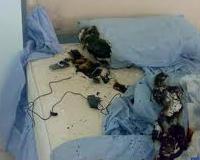
Answering mobile on charge
You could be risking your life by answering a cell phone whilst on charge... Industry scare-mongering or another urban legend?





Well certainly it’s one of those subjects which grab your attention since it seems that just about everyone has a mobile phone and it’s not that unusual to answer it while it’s on charge. But what if by doing such a simple thing you were actually risking your life? And why should it actually seem plausible and believable?
There’s quite a lot of buzz round the subject though:
- Remember when a major computer supplier company had to recall millions of laptops due to faulty batteries?
- We’re always hearing about the potential health hazard of mobile phones is never far from the news. But whilst the actual danger posed by the radiation from our GSM phones hasn’t actually been proved it’s always there – and what if there was something else just as deadly lurking in the wings?
- And anyway we all like a conspiracy theory: what better than the powers-that-be turning a slightly blind eye in the face of the huge mobile telecoms market?
- And there’s also the self-satisfaction of saving everyone you know from meeting a sticky end...
So then it’s all too easy to just forward on the warning email without even actually questioning whether it’s either authentic or even credible.
But hang on, let’s try and see what the facts are. We can only find one fatality due to what was described in the original message. It seems that a certain K Viswajith, an Indian, was electrocuted as he answered a call on his mobile which was on charge. Lots of papers cover the unfortunate accident, most of which also pointed out the fact that the device was apparently faulty...
Around the same time though there were lots of reports in the media of phones catching fire injuring their owners. In fact when Nokia looked into it, as a lot of their models were involved and particular in Asia. What turned out though was that the batteries in most cases the batteries weren’t authorised ones – non-compliant ones or just cheap fakes. A double whammy for the company – loss of revenue and negative publicity!
This sort of accident shouldn’t therefore really happen in Europe or North America, where controls are stricter to prevent a flood of dodgy imports. Not necessarily the case though in the rest of the world (particularly Asia where most of the fakes come from). This seems to explain why most of the accidents happened in India, Malaysia or Korea...
But let’s looks a bit more closely at the latest version of the message doing the rounds:
- There’s nothing to prove its authenticity or where it came from – no name, date or origin
- 4 photos of unknown origin which don’t even prove that the burned ear was related to the injured hand, or that the photos were actually linked to the subject matter
On the other hand though the Brazilian version had details, although not that convincing:
- There’s no trace of a certain António Ferreira Moita dying at St. José hospital.
- And the scientific and journalistic credentials of the member of the embassy? It all sounds a bit strange: a Canadian national alert over the death of a Brazilian, relayed in Africa. It may also be that the email signature at the bottom was automatically added on transfer – it seems that Daouda Diop does exist and occupies this post.
Finally a quick look on the internet shows that these emails are literal translations of:
- A message in English, dating from the end of 2007 for the first example
- A message in old Portuguese from 2005 for the second
The hoaxers rely on the fact that it’s easier to fall for something plausible than to question it. After all there’s no smoke without fire... How many of the people receiving his email would go as far as to verify the information?
We ought to add the seemingly obvious though - that any device plugged into the mains carries a certain risk! We’re all potentially at risk from a cheap hair drier or iron of dubious origin which is either past its best or just plain faulty...
So it seems that to answer a mobile phone on charge isn’t actually dangerous in itself. No manufacturers’ instructions advise against using it whilst on charge. On the other hand though they do strongly advise against using non-authorised, fake or faulty batteries since there’s always the real possibility of short-circuit. As a general rule it’s best to stick with the manufacturers’ accessories in original condition.
Source:
- Dell recalls 4m laptop batteries
- Nokia - check your battery
- Nokia declares war on battery pirates
- Chinese Regulators Find Mobile Phone Batteries That Can Explode
Based on the French article by Nico - HoaxTeam
hoaxbuster
Rédacteur Hoax







 Faux
Faux